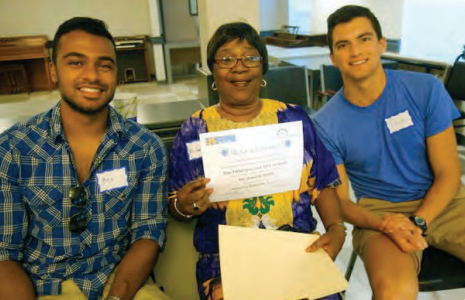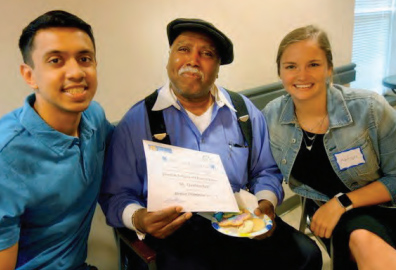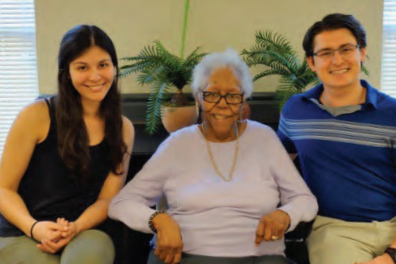Creating Human Connections Despite COVID-19: First-year Medical Students and UUH Outreach
By Kate McCorkle
During a year defined by health risks, isolation and uncertainty, College of Medicine students engaged with older adults through two opportunities made available to them through Drexel’s Office of Community Engagement and its relationship with UUH Outreach, a program serving the needs of older adults in northwest Philadelphia. As the two programs had to change in response to the COVID-19 pandemic, the human relationships at their core became more important than ever.

The former Unitarian Universalist House (UUH), a nursing home and personal care facility, was a fixture in Germantown for many decades. UUH’s merger with the former Lycoming House allowed for the creation of UUH Outreach in 1999. The program was designed to support older adults staying safely and independently in their own homes. It has since become an integral part of the aging-service system in the area.
According to UUH Outreach’s executive director, Sara Popkin, MSW, LSW, much of their work is conducted in the client’s home, and visits involve social work and nursing support. The program is client-directed in that they work with clients to determine and support their individual goals.
“We don’t come in telling clients what we think they should know or what we know,” Popkin explains. “We start by listening, because they are the experts in their own aging. We have the opportunity to work with them, not in a reactive capacity, but in a proactive, preventive capacity.” Oftentimes, client goals relate to their own interests, challenges with home safety, or access to benefits and programs for which they’re eligible.
STUDENT ROLES

College of Medicine students have been an asset in this personalized, hands-on mission through two programs: Bridging the Gaps and the Mentor project. Elissa Goldberg, MSS, LSW, program director in the Office of Community Engagement, is cited by both students and UUH Outreach staff as essential to this process. Even in a year of unprecedented challenges and particular risk for older adults, College of Medicine students joined with UUH Outreach to improve people’s quality of life.
In Bridging the Gaps, two Drexel students work with UUH Outreach for seven weeks in the summer. Popkin speaks highly of these students, saying they’ve “not only filled in some gaps for us and our team’s capacity, but also have done things that added value and new approaches to the services we offer.”
For instance, during the summer of 2020, Bridging the Gaps students helped create a program and led eight weekly groups over phone and Zoom to support otherwise isolated older adults. According to Roberta Balsam, MA, UUH Outreach’s social services supervisor, “The summer students have been absolutely amazing. They’re really an extension of us and our program.”
Students can also participate in the Mentor project as part of Drexel’s Health Advocacy Practicum (HAP), a core part of the MD program curriculum. This project “draws on the strengths of older adults,” Popkin says, and introduces their perspective and experience to the next generation of health care providers.
In this program, one or two medical students are matched with an older adult for the school year. They talk and get to know one another, and the students may assist the mentor with small tasks, such as getting to an appointment. The program culminates with the student creating a life-story project for the mentor.
Balsam says that during the Mentor project’s orientation, students often brainstorm on the word “aging.” She notes that they say things like forgetful, Alzheimers, dependency — “all kinds of negative stereotypes.” Balsam began saving those brainstorms. At the program’s end, they’d brainstorm again on “aging.” This time, she says, “We’d find talented, resourceful, humorous, busy. It’s a really great learning experience for the students to see where they started and how far they’ve come in terms of understanding individuals as they age.”
While mentors and mentees couldn’t meet in person this year due to the pandemic, the importance of that relationship remained unchanged.
BROADENING PERSPECTIVES

Kelsey Whitus, a first-year medical student from Virginia Beach, Virginia, said her main reason for selecting the Mentor project as her HAP site was wanting to “build a personal, one-on-one connection.” She also appreciated the idea of getting to know someone outside her own family or school environment, and how a different perspective could help her be a better physician. With this year’s social restrictions, Whitus says her mentor became a vital source of information and knowledge about Philadelphia, particularly since she hadn’t met all her classmates yet. “We always talked about Philly — what she’s enjoyed most and how she’s made her life here,” Whitus relates. “She showed me the ropes and made me comfortable when I moved here. Just to have someone to talk to and talk about my transition to this city was nice.”
She also says that being restricted to phone or Zoom prompted a few new experiences. For instance, her mentor participates in a World Tour on Zoom twice a week. There are over 900 participants from across the world, with a designated tour guide who shares facts, history and activities in a particular country. If not for being forced online, she would not have gotten to enjoy this with her mentor.
When the COVID-19 vaccine began being offered, Whitus was quick to discuss the registration process with her mentor. “As much as she helped me get adjusted in Philadelphia starting in August, I tried to help her,” she says.
Natalie Correa, a first-year medical student from Linden, New Jersey, was interested in the Mentor project because of the “current state of the world.” She felt “there was something really necessary about connecting with older individuals, especially at a time when everybody’s been so socially isolated. I thought about my own grandma and how I haven’t seen her in so long. The idea of being able to give someone an extra level of companionship seemed like a really nice thing to do.”
“When I moved to Philly,” Correa explains, “I was alone and isolated in my apartment.” She thought the program would be about “making sure an older adult had a social connection,” yet she discovered it was “extremely beneficial” for herself as well. She says that talking with her mentor “didn’t feel like an assignment.”
A CHALLENGING YEAR
Despite the ultimate success of Bridging the Gaps and the Mentor project, the pandemic highlighted some very real challenges. Popkin says UUH Outreach had to “balance the need for services and the importance of maintaining connection,” while simultaneously protecting staff and clients from health risks. “We tried to maintain a steady, consistent presence in our clients’ lives,” Popkin says. Complicating this task, UUH Outreach was learning the new pandemic guidelines and protocols when they’re typically the expert resource for their clients.
Additionally, self-quarantining and shelter-in-place orders pushed people who hadn’t grown up with computers, tablets and smartphones to accelerate their learning curve with these devices. “Technology is a huge issue,” Balsam notes. Even those with tablets or computers encounter challenges. “In some cases, the WiFi is unreliable,” she says. “Then the quality of the Zoom goes in and out. The sound can go in and out. There are so many obstacles.”
Besides addressing these pandemic-specific concerns and difficulties, Popkin points out that older adults, like most individuals, still have their own personal goals and interests. “They’re still growing, learning and changing regardless of age,” she says. As an organization, UUH Outreach wants to continue to support these pursuits and goals. And College of Medicine students will remain part of that effort.
Balsam lists the many ways mentees have aided mentors over the years: helping someone pack, going to doctor visits, organizing a room, assisting with paperwork or simply taking a walk. The tasks may not be glamorous, “but they’re things people really need… They can make a huge difference in somebody’s quality of life,” she says.
Reflecting on the medical students’ involvement with UUH Outreach, Balsam says, “the opportunity to actually work with the population is a great educational tool. I just don’t think a textbook can really convey what an individual can teach a student.” Students like Whitus and Correa would concur. Correa says that during her own adjustment to medical school and a new city, talking with her mentor became “something I actually looked forward to.” Since classes were conducted over Zoom, it was nice connecting with someone outside that world. “It felt like catching up with old friend,” she says. After a year of debilitating isolation, that type of human connection is invaluable.
All photos are of UUH Outreach student participants with their mentors prior to the COVID-19 pandemic.
Back to Top